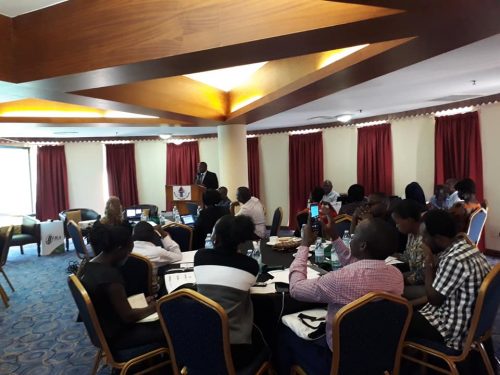By Regina Kayoyo
FRA in partnership with Slow Food Uganda, HIVOs, SEATINI and the Uganda Youth Bioversity Network on 21st February held a technical review of the draft National Development III. This was held as a public forum that brought together over 40 NSAs including the media. Among these where Members of parliament and different Ministries Departments and Agencies including National Planning Authority and the Office of the Prime Minister to input into the draft Plan with consideration of food and nutrition programming reflected across the entire Plan and further to this, consideration of a Human Rights Based approached with a major focus on the social, economic and cultural rights tethered to the Plan.
For the next 5 years (FY 2020/21-2024-25), Uganda will pursue an industrialization agenda through the NDPIII whose goal is “increased household incomes and improved quality of life”. This goal is to be achieved under the overall theme of “sustainable industrialization for inclusive growth, employment and sustainable wealth creation”. During the Plan period, the country envisages to focus on enhancing value addition in key growth opportunities (Agriculture, Tourism, Minerals, Oil & Gas and Knowledge) which have the highest potential to generate employment and positive multiplier effects on other sectors. According to the draft Plan, the country will continue to invest in maintaining and developing productive infrastructure to reduce the cost of doing business and increase connectivity especially for those areas that are lagging behind. Increasing productivity, inclusiveness and wellbeing of the population will also be fundamental to improving the quality of life of the labour force needed for industrialization as well as the life of Ugandans.
During the public forum, key note speaker Gerald Tushabe a Doctoral Research Fellow from Makerere University noted that the NDP III rightly sees the private sector as playing a key role in realizing the 2040 Agenda and the SDGs, particularly through public-private partnerships (PPPs). However the private sector has not fully respected, protected and fulfilled the human rights of workers as required. He called on NPA to consider tighten corporate accountability (CA) where victims of ESCR violations have access to effective legal remedies for instance, an enforceable minimum wage law, compensation for injuries at work, among others rather than corporate social responsibility (CSL). He noted that the fight against poverty in the NDP III must be firmly rooted on the rights-based framework as it’s the only sure guarantor for inclusive and equitable development.
Speaking about food and nutrition security in the NDPIII, Dr. Rukundo from Kyambogo University acknowledged that the draft Plan has a high potential to deliver food security but the nutrition dimensions might be insufficient. He noted that nutrition-sensitive agriculture, food systems improvement and nutrition capacity development has not received the attention it fully deserves in the Plan. As a recommendation to NPA, he called on the State to consider capacity improvement and advocacy for nutrition as essential through implementation of key supportive policy and legislations in the country.
Speaking on behalf of NPA, Sarah Nahalamba from the agricultural department emphasized the role of NSAs as playing a supplementary role to Government. She welcomed more input into the Plan that will be launched by June 2020 with the end of this current financial year 2019/20.
